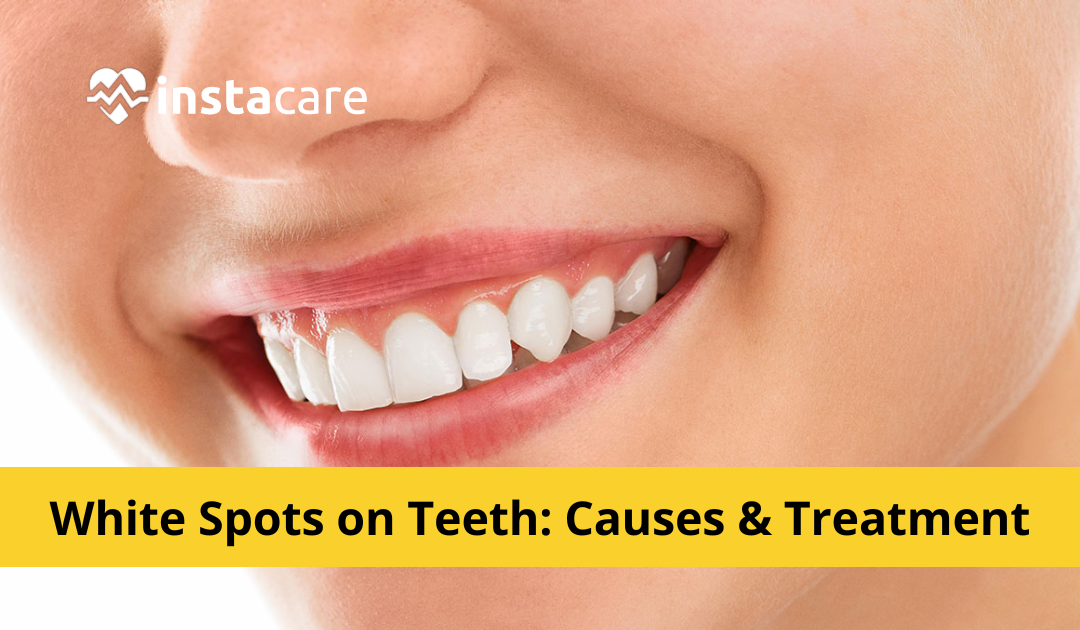Have you ever noticed mysterious white spots on your teeth? If so, you are not alone. White spots on teeth are surprisingly common, and can be the result of many different factors. While some causes of white spots may have simple solutions that do not require professional treatment, others can lead to more serious complications if they remain untreated. This blog post will discuss what causes white spots on teeth, as well as how to treat them effectively and take preventative measures to protect against further damage in the future. We'll help you understand why these pesky patches form and give you tips for avoiding them in the first place!
What is White Spots on Teeth?
White Spots on Teeth can be disconcerting, but they are a relatively common phenomenon. These spots, also known as White Spot Lesions, occur when calcium is lost from the tooth enamel. This normally happens after an injury or when the enamel is weakened due to poor oral hygiene habits.
White spots are not usually a sign of a serious problem and can sometimes disappear without any treatment; however, if left untreated they may eventually cause cavities and other dental issues. To maintain and restore optimal oral health, it is important to see your dentist as soon as possible and discuss any concerns you may have regarding White Spots on Teeth.
Causes of white spots on teeth
1- Diet
Many people don't realize that their diet can directly affect the health of their teeth. Poor oral hygiene is not the only cause of white spots on teeth. Acidic foods, sugar and fizzy drinks can all erode tooth enamel, leaving visible patches. Make sure to limit your consumption of these items to protect your pearly whites, or better yet, try replacing them with fruits, vegetables and lean proteins.
Regular dental checkups are also necessary as they can diagnose any issues in their early stages before they become too pervasive and costly. So take care of your teeth by staying mindful about what you put in your mouth and visit your dentist for regular checkups to maintain great oral health!
2- Fluorosis
Fluorosis is a condition that causes white spots to appear on the teeth, usually due to elevated levels of fluoride in drinking water. The American Dental Association estimates that over 42% of school-aged children in the United States suffer from fluorosis caused by overexposure to fluoride. Additionally, consuming too much fluoridated toothpaste, mouth rinses and supplements contributes to fluoride build-up in the body.
While they typically do not harm overall oral health, white spots can be an unwelcome surprise when you look in the mirror. If you display signs of fluorosis, visit your dentist who may recommend treatments such as topical applications or dental bonding which help reduce discoloured patches on teeth.
View More: Overcome Dentophobia - A Comprehensive Guide To Understanding And Managing Fear Of Dentists
3- Plaque accumulation
Plaque accumulation is a common problem that can lead to white spots on teeth. The buildup of bacteria and acids on the outermost layers of tooth enamel can cause wear and tear, which ultimately leads to discoloration. Not surprisingly, poor dental hygiene is the biggest contributor to plaque formation: failing to brush and floss regularly can result in a significant amount of plaque buildup over time.
Additionally, chomping on crunchy and acidic snacks can further degrade the quality of your tooth enamel, making it more prone to plaque accumulation. So if you want to keep your teeth looking pearly-white, then make sure to pay extra attention during your daily brushing and flossing routine!
4- Sleeping with your mouth open
It's a common misconception that sleeping with your mouth open only leads to bad breath, but there could be other negative effects like white spots forming on your teeth. Causes such as dry mouth, Vitamin D deficiency, and acid reflux can lead to white spots developing on your teeth. This can also be a sign of long-term neglect of dental hygiene, or even too much fluoride from certain foods or drinks.
While these spots are usually harmless, if left untreated they may lead to the decay of teeth over time. If you're worried about having white spots on your teeth, make sure to get it checked out by your dentist and start practicing better oral care at home.
Treatment of white spots on teeth
1- Microabrasion
Microabrasion is a minimally-invasive and painless dental procedure that uses a mild acid solution along with an ultrasonic device to remove white spots from the enamel surface of teeth. This is done by gently abrading and smoothing away stained patches which can be caused by fluorosis, tetracycline stains and some other congenital defects.
Treatment takes only one session of around fifteen minutes each, with results visible after the first treatment, and it can even be done on young children. Microabrasion allows individuals suffering from white spots to achieve dramatically improved tooth colour in just one visit!
2- Bleaching
Bleaching is a common treatment used to remove white spots on teeth. It works by breaking down certain pigments that are responsible for discoloring the enamel and dentin of teeth, then lightening both parts. The most commonly used bleaching product is hydrogen peroxide in either gel or peroxide-based solution form, but other materials such as carbamide peroxide or laser whitening may also be used.
Treatment time varies depending on the degree of whitening desired, but typically lasts about an hour. Bleaching can be an effective option for achieving whiter and brighter teeth without damaging them or affecting their underlying structure; however, it should not replace regular dentist visits for proper oral hygiene maintenance.
3- Veneers
Veneers can be used to treat discoloration and white spots on your teeth. They are a cosmetic solution for restoring natural, healthy looking teeth. Veneers provide you with the best of both worlds -- strength and beauty. Not only do they help protect your teeth from further damage, but they can also make your smile look beautiful.
When applied correctly, veneers are sturdy and comfortable to wear, while at the same time they correct the color and shape of your teeth to its natural state. Treatment with veneers has become increasingly popular in recent years as people realize the long-term benefits that come with a brighter, healthier smile.
Prevention of white spots on teeth
Prevention of white spots on teeth is an important part of good oral hygiene. White spots can range from mild to severe and can have a negative effect on one's confidence and self-esteem. Practicing proper brushing, flossing, and limiting sugary snacks are all great ways to prevent the development of white spots.
It is also a good idea to visit the dentist twice a year to ensure that any existing white spots are treated. Prevention of white spots on teeth requires some effort and dedication but it is worth it in order to have healthy teeth and gums.
View More: How to Whiten The Teeth 4 Important Tips
Conclusion
White spots on teeth can be an uncomfortable issue to deal with, but with the right knowledge and understanding, they can be managed. It's important to understand the potential causes of white spots, such as poor oral hygiene or fluorosis, so you can take steps to prevent them or get treatment if they occur. Individuals should make sure they brush their teeth twice a day using fluoride toothpaste and floss regularly. Additionally, those who experience white spots due to fluorosis should talk to their dental professional about treatments that may minimize their appearance.
Finally, some of the best ways to protect against enamel erosion are avoiding acidic drinks and foods and keeping up with regular preventive dental care from a qualified professional. Overall, taking proactive steps now will help keep your teeth looking and feeling healthy for years to come.
Please book an appointment with the Best Dentist in Lahore, Karachi, Islamabad, and all major cities of Pakistan through InstaCare, or call our helpline at 03171777509 to find the verified doctor for your disease.
Source: https://instacare.pk/blog/white-spots-on-teeth-causes-treatment-and-prevention












